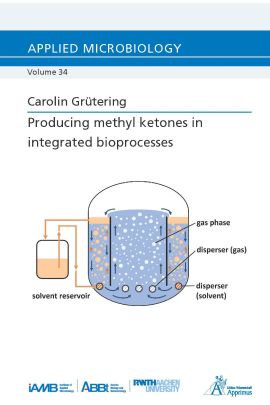Short- and medium-chain length methyl ketones are important commodity chemicals that are currently produced from petrochemical resources. To date, there is only limited research regarding the biotechnological production and purification of those methyl ketones in the scope of a circular bioeconomy.
This work elucidates integrated bioprocesses to produce methyl ketones using genetically modified microorganisms.
Methyl ketones with a chain length of C11 to C17 are produced by genetically modified Pseudomonas taiwanensis VLB120 with addition of an organic solvent to the cultivation medium for in situ liquid-liquid product extraction. The applied organic solvent decisively influences important process parameters. However, the type of solvent for in situ extraction of methyl ketones was not investigated so far, and one of the major challenges of in situ liquid-liquid extraction, the formation of stable emulsions, was unsolved. We describe an in-depth investigation of the organic solvent for in situ product extraction of methyl ketones and the subsequent recovery of the organic phase. 2 Undecanone was found as a solvent that is biocompatible, non-biodegradable, and safe, and in an advanced bioreactor setup, the multiphase loop reactor, formation of stable emulsions was circumvented. Subsequent examinations highlighted the methyl ketone blend's potential as a drop-in diesel fuel replacement.
Next, the carbon sources that are converted to the C11 to C17 methyl ketones and the associated feeding strategies were investigated. By an in silico screening approach using a genome-scale metabolic model, ethanol was found as a co-feed carbon source that enabled superior product yields. Additionally, sustainable methyl ketone production was shown to be possible by utilizing lignocellulosic hydrolysates.
A bioprocess cascade was also developed for the production of C4 methyl ketones acetoin and 2-butanone. Acetoin was produced by resting cells of Lactococcus lactis at product yields close to the theoretical maximum. The resting cell buffer was tailored to meet the requirements of an ensuing electrocatalytic reduction, transforming biotechnologically produced acetoin into 2-butanone.
Concluding, the bioprocesses for the biotechnological production of methyl ketones were developed and improved in a holistic manner. Biotechnological methods were integrated into the preceding and consecutive process steps and optimized beyond their isolated figures of merit.
| Autor | Grütering, Carolin |
|---|---|
| Gewicht | 0.303 kg |
| Erscheinungsdatum | 10.06.2024 |
Eigene Bewertung schreiben
Institut für Angewandte Mikrobiologie (iAMB)
Producing methyl ketones in integrated bioprocesses
ISBN: 978-3-98555-221-4
Lieferzeit: 2-3 Tage
49,00 €
inkl. 7% MwSt.
Kurzbeschreibung
Methyl ketones with a hydrocarbon chain length of C4 to C17 are currently produced from petrochemical resources, and there is only limited research on sustainable production and purification of those in the scope of a circular bioeconomy.
This work elucidates sustainable bioprocesses to produce methyl ketones. For this, microbial production of methyl ketones was integrated into the preceding and consecutive process steps and optimized beyond the isolated figures of merit.
Auf Lager

